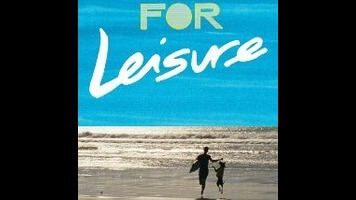Set over the 1992-’93 academic year, the film follows an extended clique of basically interchangeable graduate students as they embark on one holiday after another, hopping around the country and then the world. These vacations—announced via date and location stamps, scrawled across the screen in Cruis’n USA cursive—are just an excuse for the film’s cast of characters to lounge around and have “highbrow” conversations, ranging in topic from the Rodney King riots to the existence of multiple realities to the psychoactive qualities of nutmeg. (“I’m so mellow” becomes a kind of group motto, repeated enough times to qualify as a running joke.) There’s no plot to speak of, just a lot of non-professional actors delivering increasingly absurdist dialogue. Some of them are more non-professional than others; intentionally or not, their flat, unaffected line readings work as an ironic distancing device. The quotation marks are in quotation marks.
Meditative solo outings into the wilderness occasionally interrupt the group hangout sessions, as when one character (an odd word, given the hive-mind personality of these cloistered twentysomethings) unsuccessfully attempts to convene with tree spirits for her thesis project. Horn and Kalman shoot on 16 mm, and every outdoor scene gains a summery glow. They’ve also commissioned an absolutely perfect retro soundtrack by John Atkinson, whose dreamy arcade synth-pop places the action in the intended timeframe. The ’90s signifiers—an oversized Michael Jordan jersey; fliers announcing an “AIDS dance”; a long close-up of someone reading Al Gore’s Earth In The Balance—are so overt as to seem parodic. When two of the kids stop their one-on-one basketball game cold to sing Mariah Carey’s “Always Be My Baby,” it’s neither sarcastic nor sincere, just kind of robotic. Is the whole movie an elaborate goof on the idea of decade nostalgia?
At certain point, whether all of this is purposefully awkward becomes almost irrelevant: The non sequitur vignettes are often hilarious either way, and the film gains an oddly agreeable rhythm, especially during a nocturnal passage in which a couple of the guys make a lame attempt to seduce some high school girls. (That this scenario isn’t half as creepy as the Larry Clark-Harmony Korine movie it sounds like is probably another bonus side effect of the movie’s vague unreality—the sense that none of what we’re watching is meant to be taken strictly at face value.) L For Leisure only breaks its singular good-bad spell when it flirts with actual earnestness: Late scenes of the group’s resident wakeboard philosopher waxing rhapsodic threaten to topple the film into standard navel-gazing territory, where its glaring issues of performance look less deliberate. Without the wink to let us know there’s a joke to be in on, bad acting is just bad acting.

